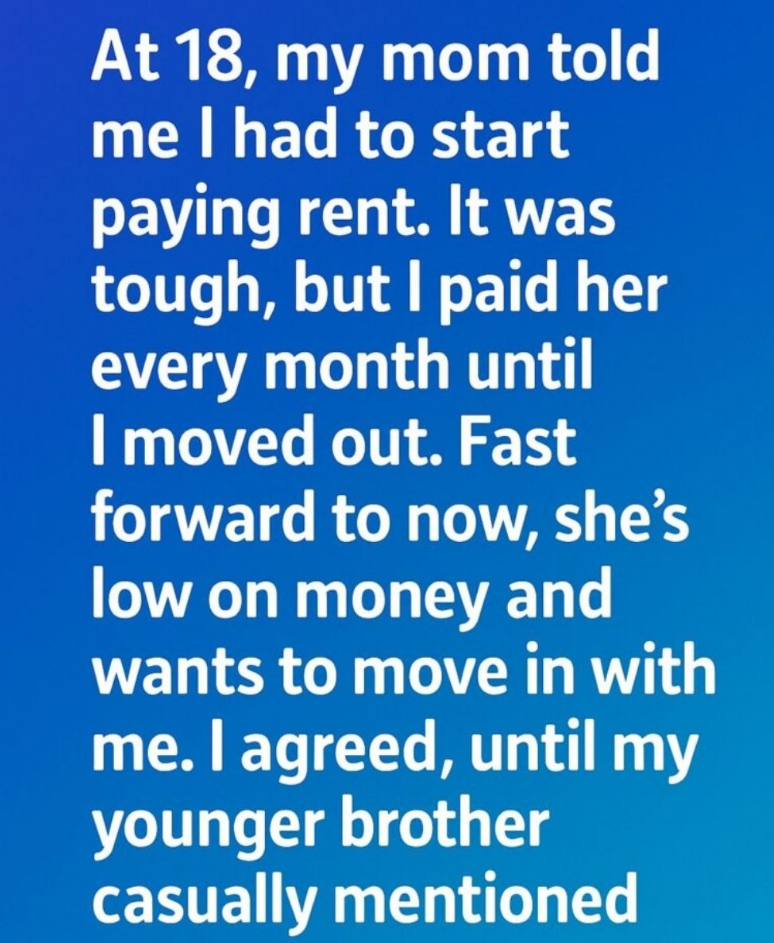When my mother first told me I had to start paying rent at eighteen, it felt like a betrayal. I remember the exact moment — the sunlight through the kitchen window, the hum of the refrigerator, the smell of morning coffee — and how every mundane detail suddenly felt like it was weighing on me. While my friends were celebrating freedom, splurging on concert tickets, late-night snacks, and weekend road trips, I was funneling my modest paycheck into the house I had grown up in. Every bill, every deposit into the family account, felt like a chain wrapped around my ankle, invisible yet heavy. For years, I swallowed the resentment like a bitter pill, telling myself it was “responsibility,” a lesson in adulthood that I had to learn sooner than anyone else. I convinced myself that my mother was teaching me a discipline that would one day pay off.
But deep down, I felt something else — something quieter, gnawing, a sense that this wasn’t about teaching me lessons but about something I couldn’t name. It sat at the edge of my consciousness like a shadow I couldn’t quite touch. I carried it silently, brushing it aside, telling myself I was being dramatic, that I was just frustrated at leaving childhood behind. And then, one afternoon, my brother — younger, charmed by every adult exception he ever received — said one sentence that shattered everything I thought I knew about our family. He casually mentioned that he had never had to pay a cent of rent. Not one dime.
The words hit like a sudden cold gust through an open door. I stopped mid-sentence, mid-breath, unable to process the gravity of it. I had built an entire narrative in my head over the years, weaving it into every story I told myself: that my mother had been harsher on me, that she loved him more, or that she simply expected me to carry burdens she never asked of him. The revelation cracked open an old, buried ache I didn’t even realize I was still carrying — a mix of anger, hurt, and confusion that bubbled up in my chest. That night, I couldn’t sleep. I replayed every interaction, every argument, every payment I had dutifully made, searching for patterns I thought justified my feelings.
Confronting my mother felt like walking into a storm I had been anticipating for years. I rehearsed my questions, my accusations, my hurt, yet every word seemed inadequate compared to the tide of emotions inside me. When I finally spoke, my voice trembled, not with anger as I had expected, but with a raw vulnerability I hadn’t allowed myself to express in years. I asked her, gently but pointedly, why she treated us differently.
Her answer was not an excuse; it was a confession, a quiet truth that immediately reframed every memory I had. She hadn’t been teaching me a lesson or punishing me for imagined shortcomings. She had been surviving. My rent, the thing I had turned over with clenched teeth and pride, wasn’t punishment — it was the thin, tenuous margin that kept us from losing our home, from spiraling into uncertainty. By the time my brother came of age, she finally had enough stability, enough breathing room to let him live rent-free. Sparing him what I went through, in her mind, was a way of making up for the years of quiet panic and struggle that I had witnessed but never understood.
The realization hit me in waves. The resentment I had carried for years, the silent comparisons, the imagined favoritism — it was all reframed. I understood now that I had mistaken desperation for hardness, sacrifice for cruelty. My mother’s choices had been measured not by preference, but by survival, by circumstance, by the precarious balancing act of keeping a family afloat in a world that never slowed down for us. What I had thought was unfairness was, in fact, love stretched thin, strained under pressure, but still holding firm in ways I had only just begun to appreciate.
In the days that followed, I found myself revisiting every memory with a new lens. Each bill I had paid, every frustrated sigh, every early morning sacrifice — it became part of a larger story, one of endurance, love, and quiet heroism. I began to see my mother not as the architect of my resentment, but as someone who had carried the weight of fear and uncertainty silently, who had made choices that sometimes hurt in the short term but ultimately kept the family intact. I started to forgive not just her, but also myself, for the anger I had held for so long.
Looking back, I realize now that these experiences shaped me in ways I couldn’t have imagined at eighteen. They taught me empathy, resilience, and the subtle art of recognizing sacrifice in the smallest of acts. My mother’s love, imperfect yet unwavering, had guided me, molded me, and in its own quiet way, prepared me to navigate the complexities of life with understanding rather than resentment. I had believed I was learning about responsibility, but what I was truly learning was about love — its endurance, its imperfection, and its astonishing capacity to stretch even when the circumstances seem impossible.
By finally understanding her truth, I could breathe differently. The anger faded, replaced by gratitude and awe. What I once saw as unfairness, I now saw as courage. And through that lens, every struggle, every hard-earned dollar, every quiet night of worry, became not a burden, but a testament to the love that had carried me all along.
